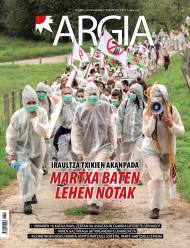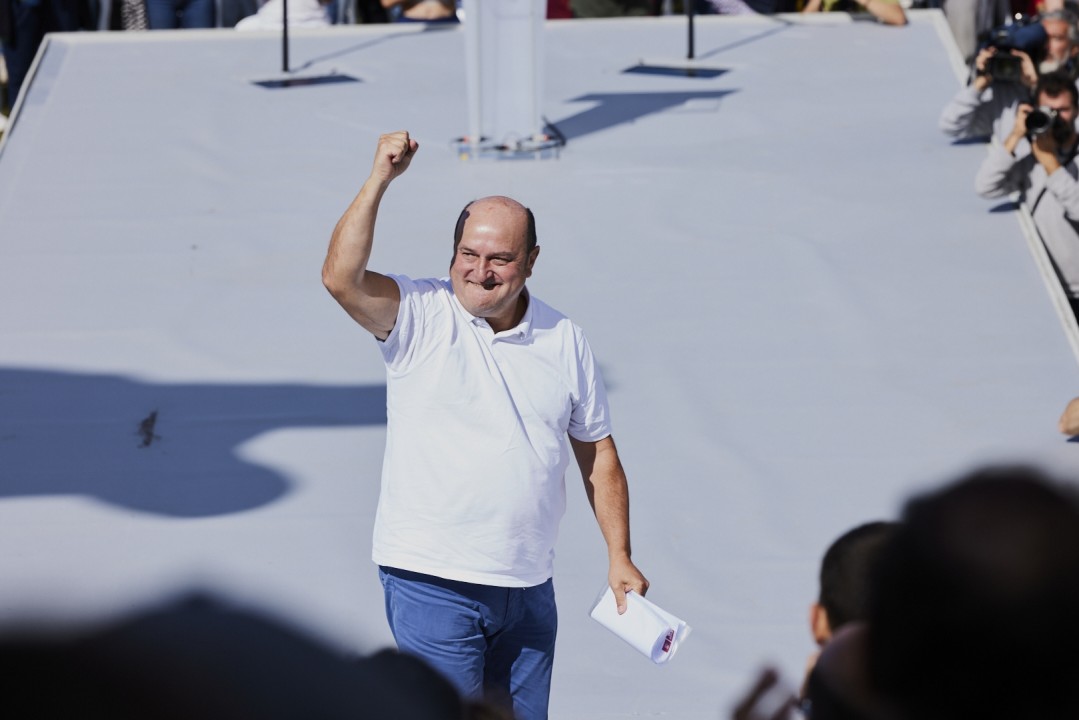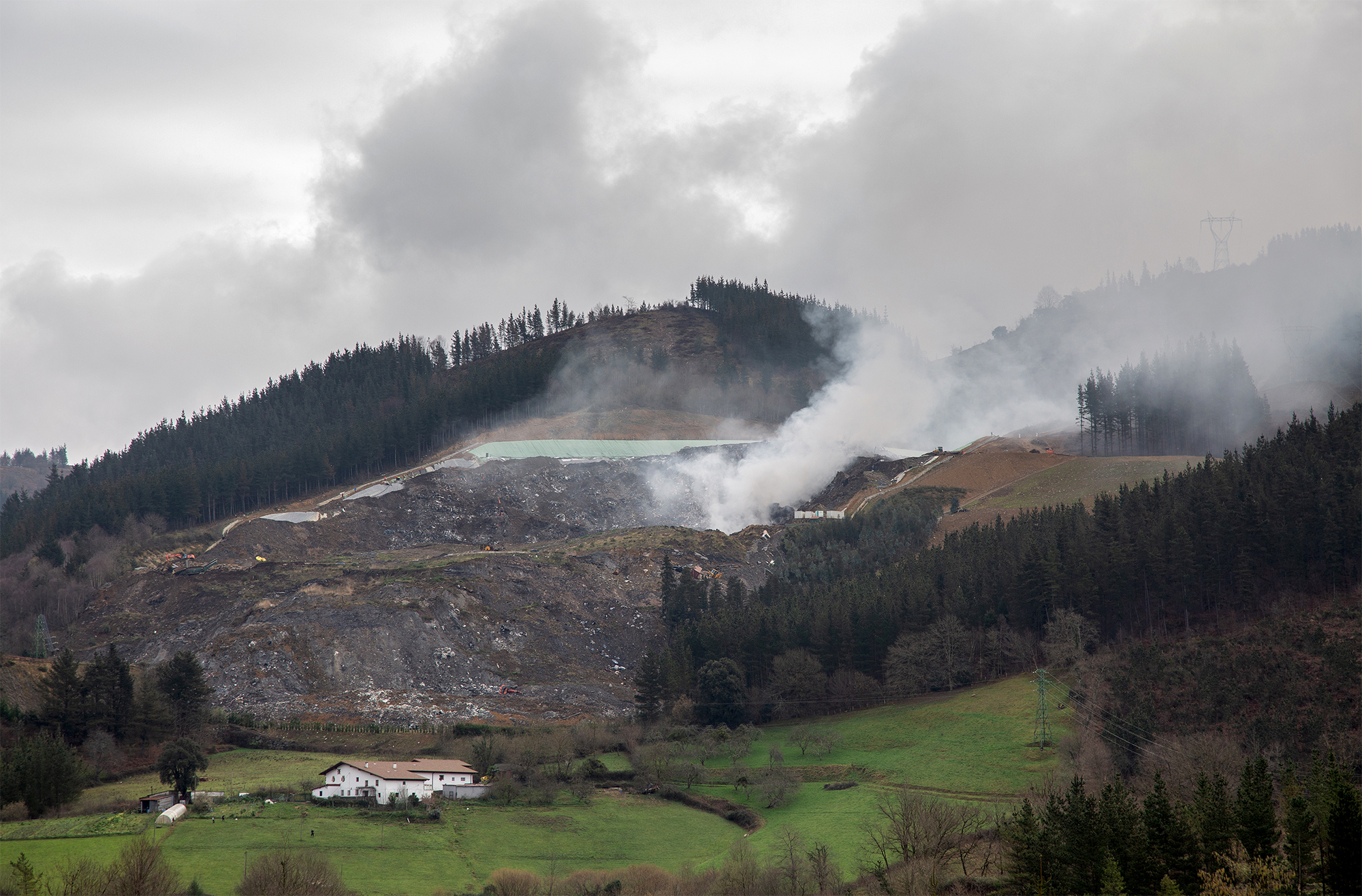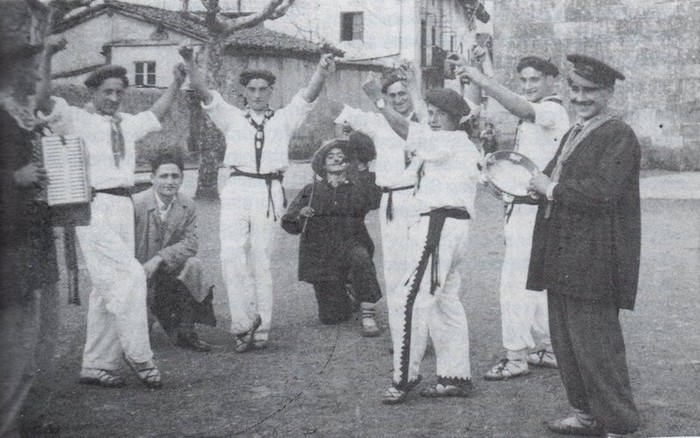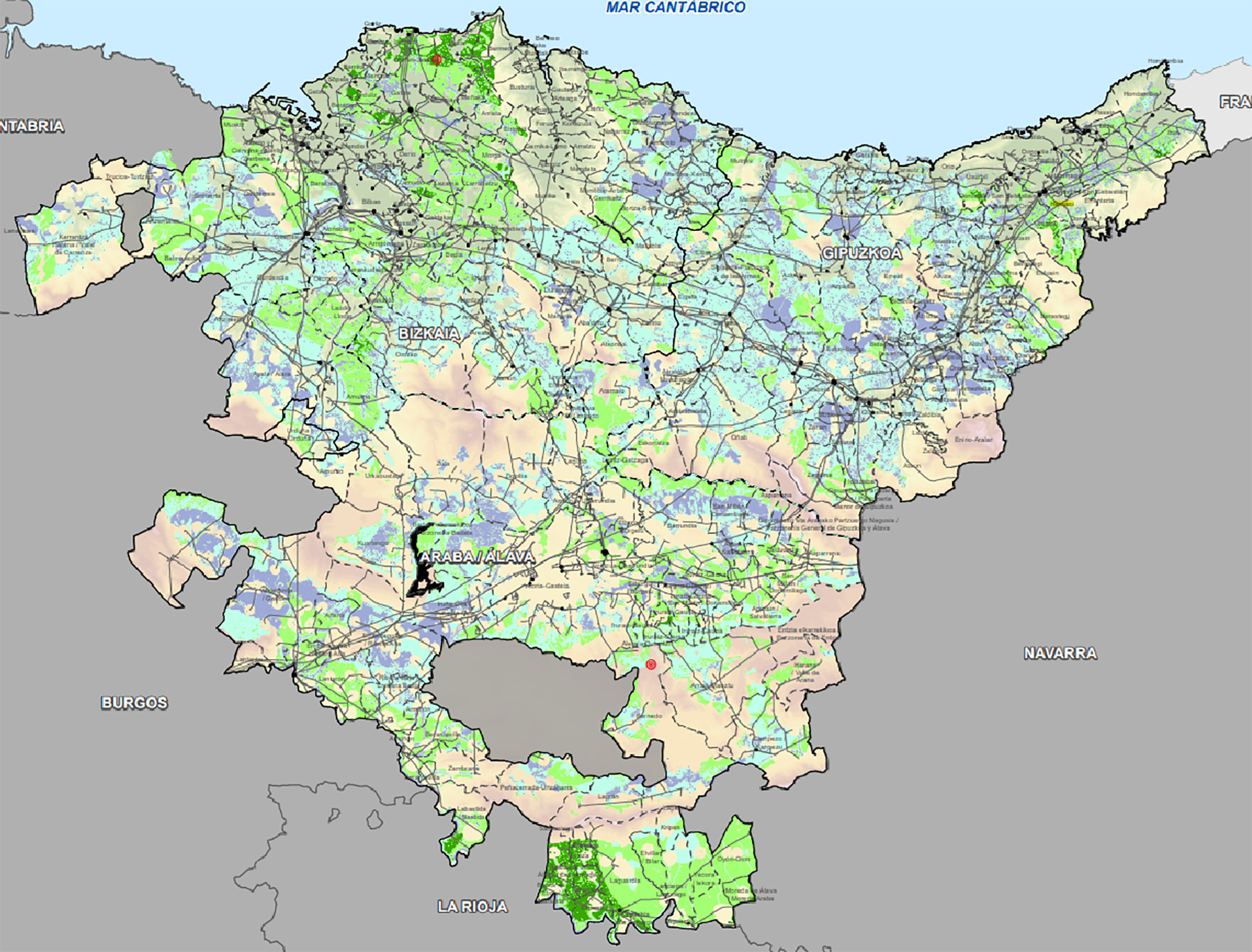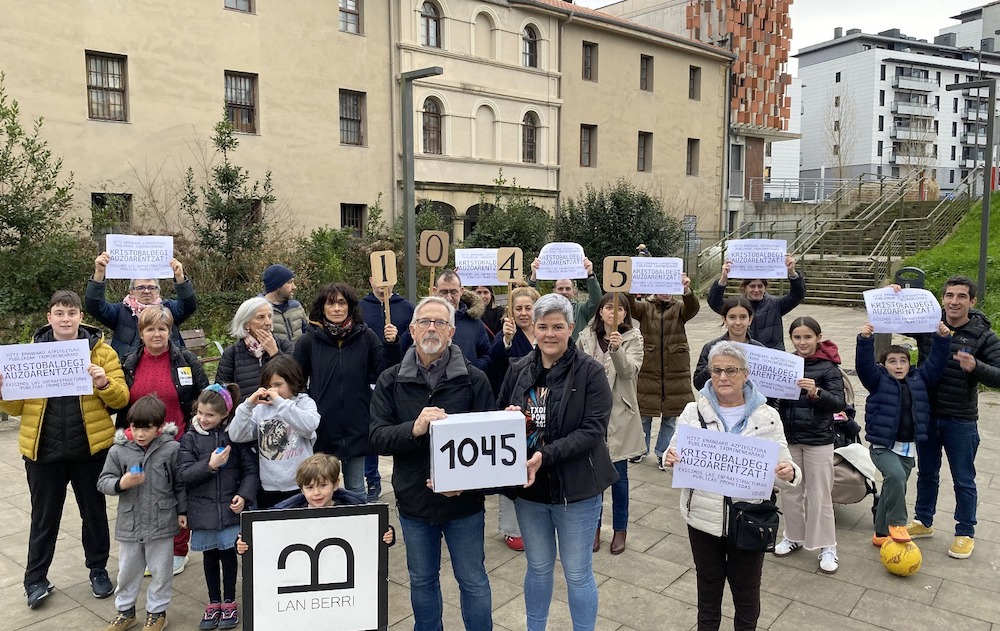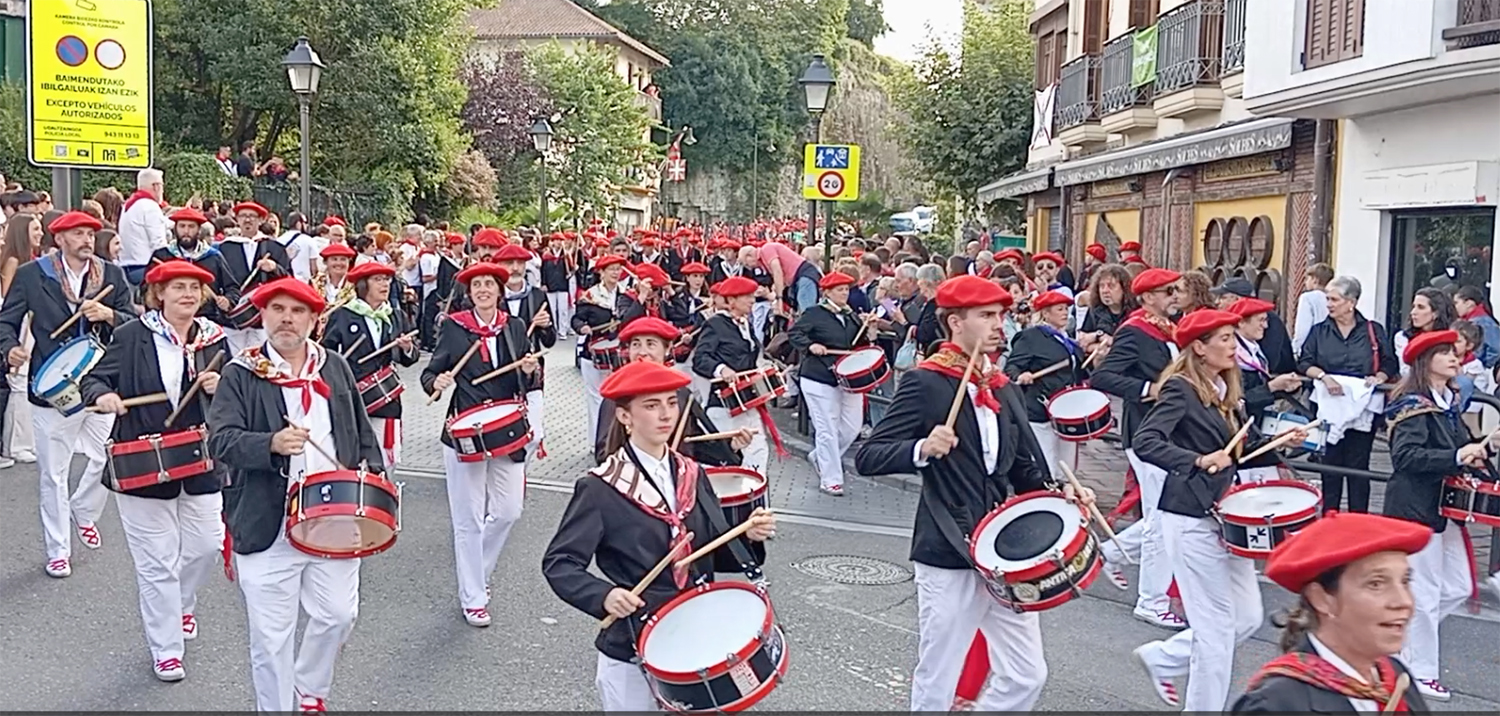From consumer to participant
- On 7 October, the Kilometroak festival will be held in Urretxu and Zumarraga. But the members of the ikastolas want to adapt that holiday model to the current context, and they have already announced that by 2020 the Kilometroak model will be changed from top to bottom. The aim of this transition is for citizens not to be mere consumers but to be participants.

“Festivities are spaces for community creation, because the norms of society are broken and new norms are established among people.” The coordinator of the festival of the Ikastolas de Gipuzkoa, Mikel Egibar, has begun the debate with the words of the thinker Jean Jacques Rousseau. It is accompanied by Igor Elortza, coordinator of Kilometroak for thirteen years. Both direct the reflection that the new holiday model has given birth. This process has lasted three years and has involved representatives of all the Gipuzkoan ikastolas and hundreds of people. In Elorza’s words, the conclusions of the reflection process have been summarized in ten premises, “to which the offer will respond”. However, the actions to be taken are still unclear.
The festival of the first Kilometroak was held in 1977, and since then society has changed a lot. The party usually has different functions depending on the time. In its beginnings, “the limits of the system were exceeded and a new community was launched around the Basque country, the ikastolas and education,” Egibar explained. However, 42 years later, “although society has changed, the holiday model remains the same.”
According to the coordinator of Ikastolen Elkartea, this premise does not occur only at the festivities of the Iparralde ikastolas. Both coincide in the need to rethink the holiday model in general in the Basque Country, as the reflection also affects the rest of the parties. They want to create a “new paradigm”, a holiday model “based on participation, cooperation, collective activity and social benefit”. Always making “our identity”, turning the seats of the people into “cultural quarry”.
Reflection “It was
very good, but not again.” These are the words of the director of the Ikastola de Bergara. These were the first words that occurred to him at the end of the festival, as he told him in the presentation of the new model held in Zumarraga in March. Every year, once the party has passed, they usually make a valuation; according to Elorza, “the valuation is usually positive, in economic, organizational terms...”, but there is always a “but”. “What kind of party do we have? Don't we get away from our nature? Concern for the model was evident.”
They want to create a “new paradigm”, a holiday model “based on participation, cooperation, collective activity and social benefit”. Always making “our identity”, turning the seats of the people into “cultural quarry”
When Egibar assumed the coordination, he put on the table a method to develop the reflection and throughout the process two concepts, “consumption and participation”, were frequently commented on. The challenge of the new model is for citizenship to move from being a “consumer” to being a “participant”.
“The festival’s context has been fully immersed in the neoliberal system, which leads to regulation and commercial functioning maintaining bonds and concrete relationships, reducing people’s participation in material consumption,” explains Egibar. In the new model, it is intended to expand the spaces of participation in which one wishes to participate. They have set the challenge as an example. It was launched for the first time in 2013 and is "a success among youth". The Ikastola de Tolosa was in charge of creating the initiative and Elorza stressed that “the desire to change the model has come from the bottom up.”
29 ikastolas, 29 plazas The
Kilometroak will be held in early October. However, its strength and size will depend on the other festivals held throughout the year. Unlike what has happened so far, from now on all the ikastolas in the country will participate in the organisation. Before the weekend of October, four or five festivals will be held in the squares of the country, and all the ikastolas of Gipuzkoa will be responsible for organizing them. “In Gipuzkoa there are 29 ikastolas and therefore we want to create 29 places,” says Egibar.
It will also change the leisure model. “We will take the stage, the txosna and the trinomial concert and drive the cultural quarry.” Students, teachers and parents will be creators. Therefore, the format of the great concerts we had seen so far will end, “we will not be obsessed with the size”, Elorza clarified. They also believe that the measure has led them to feed the mass model, so “the essence will have its importance”.
However, we must not forget that the Kilometroak objectives also include the economic goal. “We are looking for new avenues of economic support so that the search for economic support does not put our values aside,” explains Elorza. “Our field is education,” and the party is organized to maintain that pillar. In this sense, they have highlighted the need to "reconcile the pedagogical model with the party" and have turned the play activity. “The playful can not only be based on the game,” says Egibar, so they will also review Roncal’s model. In 2020 they also want to launch “a space for creation, a space for debate and other places”.
Each year, between 1,500 and 2,000 volunteers work to advance the Kilometroak. Aware of the importance of this, the members of the ikastolas movement want to continue “feeding and strengthening this community”, one of the “most precious treasures” of the ikastolas. They also want to offer these volunteers “other ways to participate”.
“We will take the stage, the txosna and the trinomial concert and drive the cultural quarry.” Students, teachers and parents will be creators. The format of the great concerts we had seen so far will end, “we won’t get obsessed with the size”
“In 2025 we don’t know what model we will have,” says Elorza, as the new model will not be “forever.” They say that the key is “continuous adjustment”, always based on the premises that have emerged in the reflection process. “We must organize the miles within these premises and fulfill these premises.”
Ten premises 1) The festival
must be a reflection of the mission of the movement of the ikastolas. (2) It should serve to consolidate the Federation of Ikastolas (as a movement corporation). 3) Clarify to whom the Festival de las Ikastolas is directed: Strengthen the ikastolas community. 4) Reduce consumption, increase participation. Enhance face-to-face relationships through ludic. 5) Strengthening nationality. 6) Relocating the cost-effective economic object of the festival based on its mission. 7) That the festival in favor of the ikastolas is the result of the whole year process. 8) Holiday format/s: innovative, contemporary, transformer/s. 9) Reposition the dimension of the party. 10) Empower students.
The objective of the Kilometroak
is to promote the participation of ikastolas from other countries of the Basque Country. They want to strengthen nationality and, to that end, they believe it is important that relations be established between citizens everywhere. The ikastolas movement usually organizes five festivities a year and although they are all in the process of transformation, the leaders of Gipuzkoa have stressed that “each one has its rhythm and its reality”, although they are convinced that “someday they will all do it”. Through the festival “they want to raise awareness” in areas such as the “use of the Basque Country, the model of participation and health”.
Also in the classroom "Zubiak batuz"
In recent years there have been important changes in the pedagogical model at the Ikastola de Urretxu. They consider diversity management to be key and have put in place new methodologies so that each student can develop their skills to the fullest.
It is the third time that the Kilometroak is celebrated in Urretxu and Zumarraga. Under the motto “Zubiak Batuz”, they intend to build bridges between the different communities and identities of the municipality, beyond narrowing the connection between the two peoples. They want the party to be a reflection of the pedagogical model of the ikastola, an “inclusive holiday”. To this end, changes have been made in areas such as the Challenge or rural sport. Spaces that have not been so far will also be enabled.
Ikastola Inclusive Ikastola pays
attention to diversity from the point of view of inclusion within its strategic plan. The aim is to take care of the diversity existing in the ikastola ecosystem and “to develop individual capacities to the fullest from respect for others”. To this end, new methodologies have been put in place.
Orientadora Eli Altolagirre states that we must understand “diversity holistically”. “Diversity is not only that there are families from different cultures,” but also students with different abilities and intelligence are a reflection of diversity, for example. Therefore, it is essential to provide the appropriate tools to be able to develop their skills based on the reality of each student. This is where Altolagirre places the responsibility of the professor. “The teacher must be a travel companion,” which offers tools.
In managing this diversity, the guidance department is particularly important. If the teacher detects something special, contact the guidance department immediately. Instead of taking the student out of the class, they usually enter counselors. “Before physical integration was done, now integral integration was done,” says Altolagirre.
In order to develop the skills of each student
as much as possible, cooperative learning has been launched. Altolagirre believes that the educational process must adapt to the interests and motivations of each student, so the programming is usually organized by classrooms.
For the development of cooperative learning, students are usually divided into groups. These groups usually last three months and within the group the role of each student varies. “Students mutually support each other”, making their skills and knowledge available, in order to foster collaboration. "We all have the ability to act on something, what it's all about is to give each one their chance," he explained.
“The functions of each student are very clearly shared within the group” and the students are often very demanding of each other. They are fully involved in the projects and “achieve a very high level of autonomy”.
Teacher training has been key to implementing this model. For this, they have had the help of the teacher and pedagogue Javier Bahon. “We are all very excited about the project and the teachers’ generational change opens up new opportunities,” says Altolagirre. Parents have also received training sessions, in which many doubts have been raised, as explained by the counsellor.
Pedagogy of trust In
Early Childhood Education, they have put in place the pedagogy of trust, prioritizing open spaces. Each student develops their learning process according to their interests. “The pedagogy of trust is very dynamic, because students have the opportunity to constantly experiment,” Altolagirre explains. The results they are getting are “very satisfied”, both teachers and parents.
Like the party, the learning model is adapting to the current context at the Ikastola de Urretxu de Zumarraga. Building bridges between diverse identities inside and outside the classroom.
.jpg)
I don't want my daughter to dress up as a Gypsy in the caldereros. I don’t want Gypsy children at my daughter’s school to dress up as Gypsies in caldereros. Because being a gypsy is not a disguise. Because being a gypsy is not a party that takes place once a year, with exotic... [+]
Zerbait egin beharra izan liteke aurtengo Argia Sarietan garaikurra jaso berri dutenen oinarria. Zapalkuntzaren, bazterkeriaren, ahanzturaren aurrean antolatzearen erabakia hartu izana. Edo ilunetik argia ateratzea, zirrikituak bilatzea eta komunitateari eskaintzea. Balio... [+]
The road goes by steps, and I learned a little while ago that it seems to have already begun. But people also want to learn to fill that sentence with content. Alone we could achieve little, maybe even resignation as soon as we started. Gathering huge crowds can also complicate... [+]
Ez zuen egoki jokatu, neurriak hartu behar ziren, bestela, ez dugu ikasten. Itxuraz, ez zen ohartzen egindakoaren inpaktuaz, normal jarraitzen zuen, batzuetan, ingurukoek baino itxura zoriontsuagoz. Gainera, altuegi hitz egiten du, hori ez zaio inori gustatzen. Darabiltzan... [+]
The Department of Education doesn't understand why public employees have gone on strike. He's got to ask the LAB Syndicate. This union signed an agreement with the department in April 2023. Two years later they have also called for a strike because, unlike the previous ones, the... [+]









